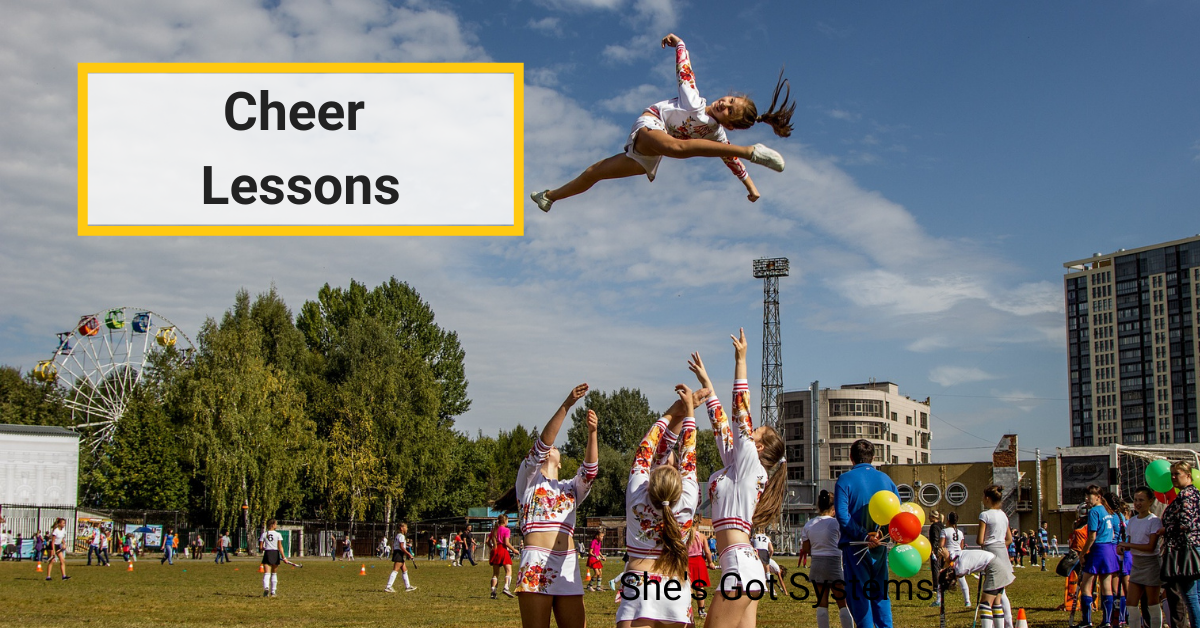This weekend I caught up on Season 2 of Cheer from Netflix and had so many thoughts and memories from school.
I was never a cheerleader but in college I joined the debate team and it had a similar sense of competition and camaraderie and intense dedication. Instead of backflips and flying, our time was spent perfecting arguments and flows.
Less risk of breaking your ribs, higher chance of getting into inane arguments everywhere you go.
In addition to my totally unqualified thoughts on the cheer routines, as I watched the series I saw many lessons we can apply as entrepreneurs.
Watching these young men and woman care so much is magical. To paraphrase one participant, “I hope everyone has something they love the way I love cheer.”
In your business it helps to find your people, the ones who care like you do and devote their lives as you have. The ones who stay up late waiting for a video game drop or geek out over new tax law implications. Your business or passion may not be as flashy as flipping in the air or as dramatic as a stumble on stage but when you’re with your people there’s common ground.
I also learned a whole shared language for cheer: hitting zero, full out, hitting it, stumblers and so many more. It’s why documentaries and series are so cool, there’s something new to learn as an outside that makes you feel part of the community.
Insider language can also be frustrating when you’re on the outside wondering what the heck someone is talking about so make a point to bring others (especially newcomers) into the know. Giving context and definitions to common language shows you are a leader and inclusive in your space – gatekeeping is so 1990s.
Watching people do what they love should inspire strangers to learn more and it was clear how much the coaches, choreographers, cheerleaders and family members care about cheer.
That dedication and passion is why it was so hard to digest season 2 episode 5, which covered the legal case against a Season 1 fan favorite, Jerry Harris, who is awaiting trial in jail for charges related to production of child pornography. As I watched the episode themes of reporting, trust, celebrity and accountability all came up.
If your community hasn’t faced a reckoning over inappropriate behavior, it likely will. It can be horrifying and heartbreaking and challenge our faith in each other. So I was grateful to see that Jerry’s friends, teammates, supporters and even his victims, did not allow such horrible actions to ruin their love for cheer.
You too might have a hard time in your field or industry because of the actions of a few. Addressing it all head on and digging out the rot is essential to moving through it. As we’ve previously seen with Penn State athletics and US gymnastics, the alternative is allowing abuse to continue for decades.
There are so many themes I could discuss: teamwork, goals, incentives, practice, dedication, resilience, but there’s one line from the show that has stuck in my head since I heard it.
Cheer Season 2 followed two Texas schools competing head to head at the 2021 Nationals. Each school does their routine twice and the scores are combined.
During the first performance, one school experienced a few major fumbles in their routine. Afterwards in the hotel, the coaches review the scores and noted that they still received very high scores considering the faults.
One coach tells the team, “the judges want you to win.”
While I can’t give too much credence to an unrehearsed line in the heat of competition, I have to think that there’s a big difference between believing the best will happen and things will work itself out versus thinking the game is rigged for me.
I have 3 thoughts on this statement:
Historically, our institutions and programs are “rigged” for certain people to win. This is neither equitable nor likely to change without focused activism. Believing that others want me to win is not just self-centered but assumes personal supremacy not granted by effort.
Second, I’m someone who loves to win but I’d rather win because of my talent than be the recipient of nepotism. Knowing that a judge wants me to win and may judge me less than fairly doesn’t make me work harder, it actually tells me to be lazy, after all, I’m gonna win no matter what.
Third, there’s a big difference between trusting something will work out for good and winning. These students face careers and lives that will be full of losses, learning to grow from those moments is more powerful than another trophy or ring. Seeing the lessons in losing is as important as the pride that comes with winning.
I don’t fault the coach for encouraging his athletes in the middle of a major competition, but I do disagree with his belief that their win is guaranteed.
Trust me, one day you’ll have a box of your trophies and cups and a clock for some unknown reason, and it’ll stir up some good memories at least. What sticks with you after a winning or losing season is the friends you spent time with, the coaching that supported your growth, and the resilience you developed along the way. Everything else is just hardware.

 Are you the bottleneck in your business?
Are you the bottleneck in your business? Do you love your business?
Do you love your business? Overcoming the “I don’t know hows”
Overcoming the “I don’t know hows”